Abbiamo avuto l’occasione di conoscere e scambiare quattro chiacchiere dal vivo con Orbe, consolidato produttore techno in Spagna.
Orbe, pseudonimo di Fernando Sanz, è un colosso della scena techno spagnola ormai da molti anni. Originario di Algeciras, una cittadina di mare in provincia di Cadice nel sud della Spagna, si è da poco trasferito a Malaga, dove vive della sua musica.
Il primo contatto con la musica elettronica arriva molto presto per Orbe: a 14 anni inizia infatti ad ascoltare il breakbeat, genere molto popolare nell’Andalusia di quegli anni (e anche di adesso, a dirla tutta). Da quel fatidico momento, la musica farà parte della sua vita in maniera costante.

A 18 anni si trasferisce a Siviglia e studia una formazione professionale di tecnico del suono. È allora che inizia a dedicarsi alla produzione musicale da autodidatta. A Siviglia Orbe entra a contatto con la musica techno, più precisamente con il minimal. Dopo 3 anni si trasferisce a Madrid per studiare alla SAE come engineer of sound, rimanendo a vivere nelle capitale per i successivi 15 anni.
Nel 2014 il produttore spagnolo fonda la sua etichetta discografica, Orbe Records, inizialmente con uscite in solo vinile, attualmente in vinile e digitale. Con la terza uscita ORB003, “Music of the Spheres” Orbe ottiene un notevole successo, con importanti riconoscimenti da parte di Nina Kraviz, Marcel Dettmann, Dj Nobu e altri. Nella capitale Orbe inizia a muoversi e a ottenere le sue prime date importanti, suonando con artisti del calibro di Maceo Plex e iniziando a muoversi in tutta Europa.

Attualmente Orbe continua ad essere un consolidato e prolifico produttore techno oltre che un acclamato DJ, con date in Europa e, recentemente, anche oltreoceano. Abbiamo avuto l’occasione di incontrarlo a Malaga e di intrattenere una piacevole conversazione con lui.
Ciao ORBE e benvenuto su Parkett, siamo davvero contenti di conoscerti. Ci piacerebbe chiederti innanzitutto come stai e come è iniziato questo 2024 per te?
Ciao Parkett! Grazie, il piacere è mio.
Sto bene, sono molto felice. Mi è mancata molto Madrid nell’ultimo anno, ma sono felice qui a Malaga. Il 2024 è iniziato molto bene perché ho da poco concluso il mio primo tour negli Stati Uniti, dove non ero mai stato. Oltre a questo, ho pubblicato due dischi con due etichette molto importanti, che sono KSR di Kaiser e Mote Evolver di Luke Slater. L’ultimo disco, che è una collaborazione tra me e Psyk, è stata una vera soddisfazione. Oltre ad avere una profondissima ammirazione per Luke, il giorno dopo l’uscita era già al numero 1 delle vendite su deejay.de e nella top 100 di Beatport.
Sappiamo che hai da poco concluso il tuo primo tour negli Stati Uniti. Com’è stata l’esperienza? Hai notato differenze tra il mondo del clubbing statunitense e quello europeo e/o ti senti ispirato da qualcosa in particolare del panorama musicale d’oltreoceano?
È stata davvero una bella esperienza. Il viaggio è durato 20 giorni, con cinque date in totale. Ho iniziato da Boston, poi New York, Miami, Tampa e Orlando. La scena clubbing mi è sembrata molto interessante, diversa, perlomeno quella che io ho vissuto personalmente. Credo che non ci siano molti club che si dedichino all’elettronica con una programmazione settimanale, piuttosto quello che si fa molto spesso è affittare uno spazio e tutto l’equipaggiamento acustico necessario, chiamare i DJs e montare una festa lì. A St. Pete, per esempio, ho suonato in una galleria d’arte, e a New York in uno studio di fotografia, uno di quelli con lo sfondo grande e bianco: è stato bellissimo. E anche a Miami non erano club appositi, ecco. I promoter e le feste sono conosciuti, ma poi gli spazi si affittano e cambiano ogni volta. E danno molta importanza agli impianti acustici, quello sì. Quest’ultima è una differenza che ho notato, ad esempio, con la Spagna, dove c’è spesso carenza di un buon sound system e dove tutte le sale devono utilizzare limitatori acustici, che per un dj, beh, sono un grosso limite. Negli Stati Uniti ho notato che si dà davvero una grande priorità al suono rispetto a tutto il resto. Alla fine è musica ciò che si sta andando a sentire! In generale è stata un’esperienza davvero arricchente, ho conosciuto molte persone, molti punti di vista nuovi ed è stato molto d’ispirazione per me osservare quel vissuto, dopo nemmeno una settimana che ero lì avevo già voglia di andare in studio.

Abbiamo parlato di presente e futuro, ma siamo curiosi di sapere un po’ di più anche sul tuo passato. Com’è iniziata la tua carriera come dj e produttore? Se presenti, quali sono state le fonti di ispirazione più decisive per la tua produzione personale?
Ho iniziato nella mia città, Algeciras, a 14 anni. Mio fratello portava a casa alcune cassette registrate in casa da un suo amico, che mixava musica breakbeat. I temi erano mixati malissimo (ride), ma io ne ero estasiato, la musica che metteva per me era incredibile. Lì iniziai a pensare che tutto questo mi piaceva tantissimo, che anch’io volevo farlo. Cominciai a comprare i miei primi dischi di breakbeat e new school per collezionarli, e come regalo di fine corso chiesi ai miei genitori di comprarmi un giradischi: da lì, ho iniziato a suonare. Inizialmente suonavo breakbeat, ma poi a Siviglia ho cambiato completamente direzione: erano gli anni di Richie Hawtin, Luciano, Villalobos… È lì che ho iniziato a immergermi nel mondo del techno. Da Siviglia mi sono poi trasferito a Madrid e ho iniziato a lavorare più seriamente come produttore e artista.
La tua musica evoca spesso, in qualche modo, atmosfere ultradimensionali. Trame profonde, melodie ipnotiche dai toni oscuri conducono l’ascoltatore in un mondo fortemente interconnesso alla natura, alla biologia e ai numeri, ma anche ad aspetti cosmici, persino di altre galassie (Vedi “Andromeda”, una delle tue ultime releases). Questo è quello che percepiamo dalle tue creazioni, dai suoni e dai ritmi che utilizzi, dai titoli, fino ad arrivare alle copertine dei tuoi dischi. Ci sbagliamo? Quali sono i temi più ricorrenti che vuoi evocare attraverso la musica?
In realtà non è che il mio scopo principale sia evocare qualcosa di specifico o trasportare chi mi ascolta in un posto preciso. La musica, e più in particolare il techno, per me è libertà. Grazie a questa libertà io posso esplorare il suono, registrarlo, distorcerlo a mio piacimento, aggiungere un effetto. E da lì, far uscire qualcosa. È vero che ci sono elementi ricorrenti. La natura, ad esempio, è qualcosa che mi piace davvero molto. Uno dei miei ultimi album, “El Bosque de la Niebla“, si ispira a un bosco situato nel Parco Naturale El Estrecho, nella mia provincia natale, e ogni titolo contiene la coordinata di un punto preciso di quel bosco, chiamato “Bosco della Nebbia”, perché è avvolto dalla nebbia per circa 200/250 giorni all’anno a causa della sua posizione. Quel posto è allucinante. Non lo so, per me è un po’ mettere il mio vissuto in ciò che creo, in un certo senso. Per quanto riguarda i titoli, è qualcosa che viene alla fine del processo. I miei titoli io li scelgo quando viaggio, magari leggo un cartello, o una scritta, e allora appunto la parola o la frase e poi la utilizzo per il prossimo disco. Durante un tour a Kiev, per esempio, mi sono appuntato moltissimi nomi che mi avevano incuriosito, nomi scritti su cartelloni, su cabine telefoniche, fuori dai negozi… Da lì è nato il nome del mio album “Psy Visionary“, oltre che di tutte le tracce al suo interno. In conclusione, la musica per me è qualcosa di naturale, lo è sempre stata e la porto dentro di me, quello che poi faccio e trasmetto è il mio vissuto, sono i miei interessi.
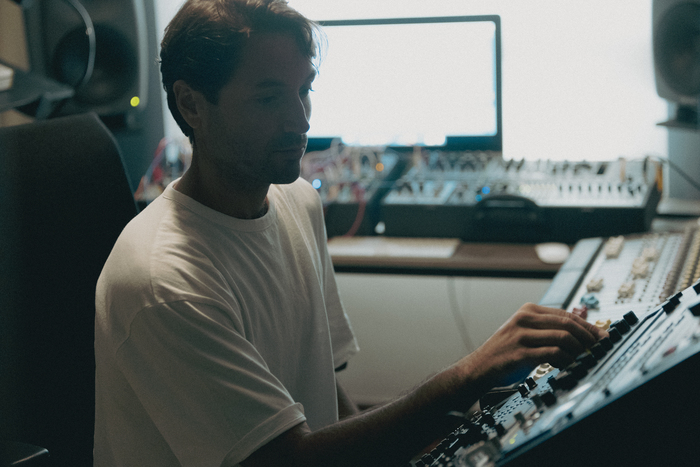
Parlaci del tuo processo creativo. Di cosa hai bisogno per creare una nuova traccia? Quanto tempo dedichi in generale alla produzione della tua musica?
Io mi siedo nel mio studio e sperimento. Accendo gli strumenti, inizio a provare suoni, a registrare qualcosa che ho appena fatto e che mi è piaciuto, lo metto in un sampler, lo provo e lo riprovo. Improvviso come se fosse una jam e registro tutto il tempo. Quando poi ho abbastanza idee per il progetto, inizio a dargli una direzione. Per me la creazione avviene tutta nello studio, non fuori. Per quanto riguarda le tempistiche, è difficile da quantificare, potrei terminare una traccia intera in un pomeriggio o in una settimana. Dipende quanto io sia proattivo in quel momento. C’è un disco di 4 tracce che ho fatto letteralmente in un pomeriggio, per altri ho tardato magari un mese. Però passo molto tempo in studio provando, quello sì. Provo e riprovo e quando arriva l’idea, registro.
Sappiamo che attualmente, oltre a pubblicare la tua musica attraverso diverse etichette di prestigio – Axis Records, KSR, Token, Semantica per citarne alcune – ne possiedi anche una propria, Orbe Records. Puoi dirci com’è iniziata questa esperienza e come sta proseguendo?
Orbe Records nasce nel 2014, quando vivevo a Madrid già da diversi anni. Ho creato l’etichetta per la volontà di avere un mio tratto distintivo, una mia “firma”, oltre che per poter pubblicare la mia musica. Il progetto iniziale era pubblicare solo in vinile, ma col passare degli anni ho dovuto modificarlo e aprirmi anche al digitale. La terza uscita, ORB003, fu una vera soddisfazione, perché ottenne molto successo e riconoscimento da parte di DJs che ammiro molto quali Nina Kraviz, Marcel Dettmann e Blawan, tra gli altri. Quel disco mi ha aiutato molto, lo hanno proposto in diversi festival e da quel momento in poi ho iniziato a suonare e a spostarmi di più. Grazie a Orbe Records sono cresciuto molto come artista e ho creato una mia firma. In più sento di aver fatto sempre tutto tranquillamente, con il tempo naturale delle cose. Quando ho pensato di essere pronto e di avere un certo livello, ho aperto la label. E non ci ho nemmeno pensato così tanto: posso dire che la musica ha sempre fluito in maniera del tutto naturale nella mia vita. Il mio obiettivo è stato sempre quello di dedicarmi alla musica, vivere della musica, essere felice con la musica. Partendo da questo presupposto, le cose sono successe spontaneamente.
La tua produzione dell’ultimo anno è decisamente notevole, ben 9 releases, più altre 2 quest’anno, e siamo solo a marzo. Tra queste, potresti dirci se ce n’è stata una particolarmente importante per te da produrre, e perché?
Tutte sono state un’ottima esperienza per me e ho molta stima e affetto per ogni etichetta con la quale ho pubblicato la mia musica. Dovendo sceglierne una in particolare, dico “El Bosque de la Niebla“, di cui ho parlato anche poco fa. Il disco ha un valore affettivo per me. Il titolo dell’album l’ho dedicato al luogo da dove provengo e le tracce sono ognuna una coordinata precisa di alcuni punti in particolare, infine la foto della copertina l’ho scattata io personalmente. Che dire poi di Semantica? È un’etichetta validissima e con cui sono veramente contento di lavorare.
Ultima domanda. Ci sono progetti futuri in vista? Ti piacerebbe anticiparci qualcosa?
Ci sono molti progetti futuri. Al momento un progetto aperto e che è già iniziato è la mia collaborazione con Psyk, con il quale ho pubblicato già due dischi e presto ne uscirà un terzo. Anche singolarmente continuerò a produrre musica, ad esempio uno dei prossimi dischi sarà un’uscita in vinile per Semantica. Per quanto riguarda Orbe Records ho molti progetti in mente: a parte alcuni remixes, ho sempre pubblicato solo la mia musica attraverso l’etichetta, invece quest’anno ho intenzione di pubblicare anche altri artisti, in particolare Mathys Lenne e Elias Garcia, che sono due produttori per me incredibili e che voglio appoggiare per il loro talento. Questi sono un po’ le mie idee future, ma sono comunque aperto all’improvvisazione e al fluire naturale delle cose, come sempre.
Grazie Parkett!
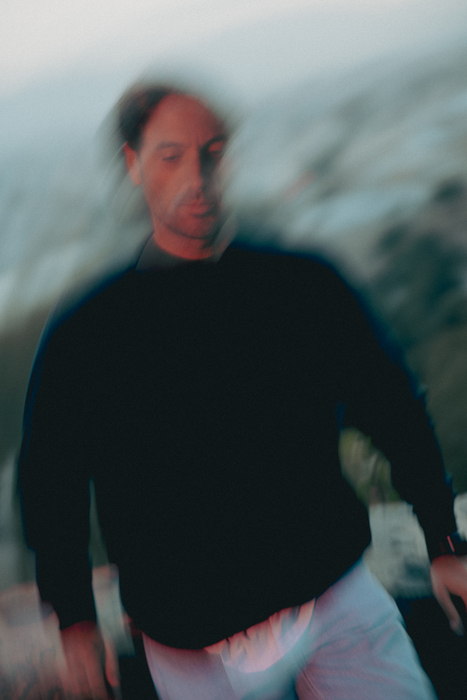
ENGLISH VERSION
ORBE: “Music has always flowed very naturally in my life.”
We had the opportunity to meet in person and exchange a few words with Orbe, a well-established techno producer in Spain.
Orbe, the pseudonym of Fernando Sanz, has been a titan of the Spanish techno scene for many years. Originally from Algeciras, a coastal town in the province of Cadiz in southern Spain, he recently moved to Malaga, where he continues his professional career in music.
Orbe’s first encounter with electronic music came quite early in life: at the age of 14, he began listening to breakbeat, a popular genre in Andalusia at the time (and still is, to this day). From that fateful moment, music became a constant in his life.
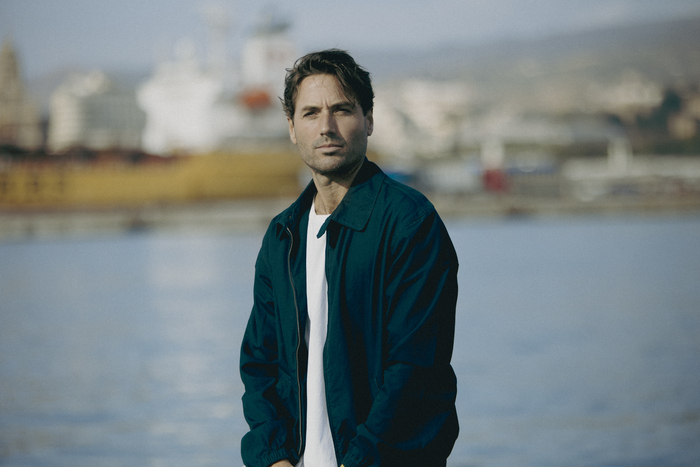
At the age of 18, he moved to Seville and pursued vocational training as a sound technician. It was then that he began to learn music production. Here, Orbe was first introduced to techno music, minimal techno to be precise. After 3 years, he moved to Madrid to study sound engineering at SAE and lived in the capital for the next 15 years.
In 2014, the Spanish producer founded his own label, Orbe Records, initially releasing solely on vinyl, before going on to release on digital formats. With the third release, ORB003, “Music of the Spheres,” Orbe achieved considerable success, garnering significant recognition from Nina Kraviz, Marcel Dettmann, Dj Nobu, and others. In the capital, Orbe began to make his mark and secure his first important dates, playing alongside artists such as Maceo Plex and starting to tour across Europe.

Currently, Orbe continues to be an established and prolific techno producer as well as an acclaimed DJ, with gigs across Europe and, more recently overseas. We had the opportunity to meet him in Malaga and engage in a pleasant conversation with him.
Hello ORBE, and welcome to Parkett. We’re really glad to meet you. Firstly, we’d like to ask how are you and how has 2024 started for you?
Hello Parkett! Thank you, the pleasure is mine.
I’m doing well, very happy. I missed Madrid a lot in the last year, but I’m happy here in Malaga. 2024 has started very well because I’ve recently completed my first tour in the United States, where I had never been before. Besides that, I’ve released two records with two very important labels, KSR by Kaiser and Mote Evolver by Luke Slater. The latest record, which is a collaboration between Psyk and me, was a real success. Besides having a deep admiration for Luke, the day after the release, it was already number 1 in sales on deejay.de and in the top 100 of Beatport.
We know you’ve recently completed your first tour in the United States. How was the experience? Did you notice any differences between the clubbing scene in the United States and Europe, and/or do you feel inspired by something in particular in the American music scene?
It was a really great experience. The trip lasted 20 days, with five dates in total. I started in Boston, then New York, Miami, Tampa, and Orlando. The clubbing scene seemed very interesting to me, different, at least from what I have personally experienced. I don’t think there are many clubs that focus on electronic music with a weekly schedule; rather, what often happens is renting a space and all the necessary sound equipment, calling DJs, and throwing a party there. In St. Pete, for example, I played in an art gallery, and in New York, in a photo studio, one of those with a large white background; it was beautiful. And even in Miami, there weren’t specific clubs, you see. The promoters and parties are well-known, but then the spaces are rented and change each time. And they really emphasize the sound systems, that’s for sure. That’s a difference I noticed, for example, compared to Spain, where there’s often a lack of a good sound system, and where all venues have to use acoustic limiters, which for a DJ, you know, is a big limitation. In the United States, I noticed that sound is really given a high priority over everything else. Ultimately, it’s music that people are going to hear! In general, it was a truly enriching experience, I met many people, many new perspectives, and it was very inspiring for me to observe that experience, after barely a week there, I already felt like going to the studio.
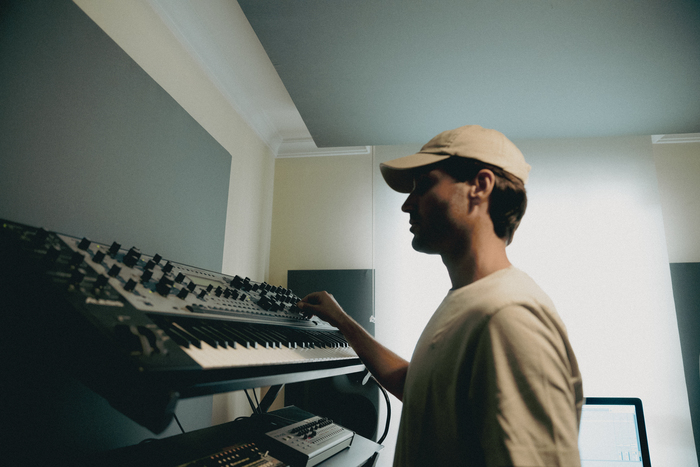
We’ve talked about the present and the future, but we’re also curious to know more about your past. How did your career as a DJ and producer begin? And if there are, what were the most decisive sources of inspiration for your personal production?
I started in my hometown, Algeciras, at the age of 14. My brother brought home some cassette tapes recorded by a friend of his, who mixed breakbeat music. The tracks were mixed terribly (laughs), but I was ecstatic; the music he played was incredible for me. That’s when I started thinking that I loved this all so much, that I wanted to do it too. I began buying my first breakbeat and new school records, collecting them, and as a graduation gift, I asked my parents to buy me a deck. From there, I started playing. Initially, I played breakbeat, but it was in Seville that I completely changed direction: in Seville, I went to techno parties during the years of Richie Hawtin, Luciano, Villalobos. From there, I moved to Madrid, and that’s where I started working more seriously as a producer and artist.
Your music often evokes, in some way, ultra-dimensional atmospheres. Deep textures, hypnotic melodies with dark tones lead the listener into a world strongly interconnected with nature, biology, and numbers, but also with cosmic aspects, even from other galaxies (See “Andromeda,” one of your latest releases). This is what we perceive from your creations, from the sounds and rhythms you use, from the titles, to the covers of your records. Are we wrong? What are the most recurring themes you want to evoke through music?
Actually, my main goal is not to evoke something specific or transport the listener to a specific place. Music, and more specifically techno, for me, is freedom. Thanks to this freedom, I can explore sound, record it, distort it as I like, add an effect. And from there, bring something out. It’s true that there are recurring elements. Nature, for example, is something that I really love. One of my latest albums, “El Bosque de la Niebla” is inspired by a forest located in the Estrecho Natural Park, in my hometown, and each title contains the coordinates of a specific point in that forest, called “Foggy Forest”, because it’s shrouded in fog for about 200/250 days a year due to its location. That place is mind-blowing. I don’t know, for me, it’s a way of putting my experiences into what I create, in a certain sense. As for the titles, it’s something that comes at the end of the process. I choose my titles when I travel, maybe I read a sign or a writing, and then I note down the word or phrase and then use it for the next record. During a tour in Kiev, for example, I noted down many names that intrigued me, names written on billboards, on phone booths, outside shops… From there came the name of my album “Psy Visionary,” as well as all the tracks within it. In conclusion, music for me is something natural, it always has been, and I carry it within me; what I then do and transmit is my experiences, my interests.
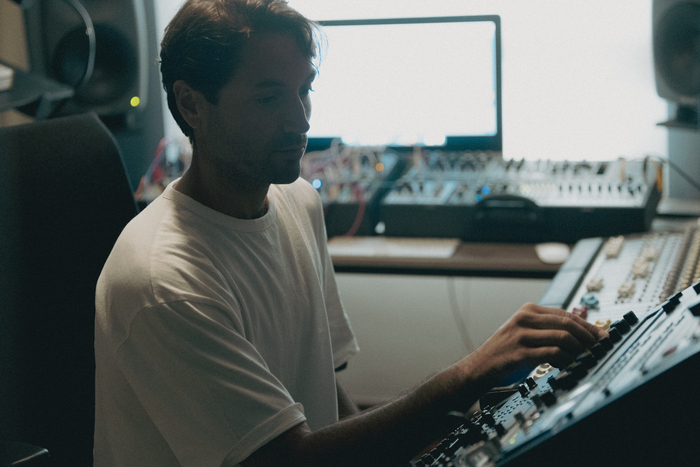
Talk to us about your creative process. What do you need to create a new track? How much time do you generally dedicate to producing your music?
I sit down in my studio and experiment. I turn on the instruments, start trying out sounds, record something I’ve just made and liked, put it in a sampler, try it out again and again. I improvise as if it were a jam session and record all the time. When I have enough ideas for the project, I start giving it direction. For me, creation happens all in the studio, not outside. As for the timing, it’s hard to quantify; I could finish an entire track in an afternoon or in a week. It depends on how proactive I am at that moment. There’s a 4-track record I literally made in an afternoon, for others, it might have taken me a month. But I spend a lot of time in the studio trying things out, that’s for sure. I try and try again, and when the idea comes, I record it.
We know that currently, in addition to releasing your music through various prestigious labels – Axis Records, KSR, Token, Semantica to name a few – you also have your own label, Orbe Records. Can you tell us how this experience started and how it’s going?
Orbe Records was born in 2014, when I had been living in Madrid for several years already. I created the label with the desire to have my own distinctive mark, my own “signature,” as well as to be able to release my music. The initial project was to release only on vinyl, but over the years I had to modify it and open up to digital as well. The third release, ORB003, was a real satisfaction because it achieved a lot of success and recognition from DJs whom I greatly admire such as Nina Kraviz, Marcel Dettmann, and Blawan, among others. That record helped me a lot; it was featured in several festivals and from that moment on, I started playing and traveling more. Thanks to Orbe Records, I have grown a lot as an artist and created my own signature. Moreover, I feel like I have always done everything calmly, with the natural timing of things. When I thought I was ready and at a certain level, I opened the label. And I didn’t even think about it that much: I can say that music has always flowed very naturally in my life. My goal has always been to dedicate myself to music, live off music, be happy with music. Starting from this premise, things happened spontaneously.
Your production over the past year has been quite remarkable, with a total of 9 releases, plus 2 more this year, and we’re only in April. Among these, could you tell us if there was one particularly important for you to produce, and why?
All of them have been a great experience for me, and I have a lot of respect and affection for every label with which I have released my music. If I had to choose one in particular, I would say “El Bosque de la Niebla” which I mentioned earlier. The album has sentimental value for me. I dedicated the album title to the place where I come from, and each track is a precise coordinate of particular points, and I personally took the photo for the cover. And what about Semantica? It’s a very established label, and I’m really happy to work with them.
Last question. Are there any future projects in progress? Would you like to give us a sneak peek?
There are many future projects. Currently, one ongoing project is my collaboration with Psyk, with whom I have already released two records, and soon a third one will be released. Individually, I will continue to produce music; for example, one of the upcoming records will be a vinyl release for Semantica. As for Orbe Records, I have many projects in mind: apart from some remixes, I have always released only my music through the label, but this year I intend to also release other artists, particularly Mathys Lenne and Elias Garcia, who are two incredible producers for me and whom I want to support for their talent. These are some of my future ideas, but I am open to improvisation and the natural flow of things, as always.
Thanks Parkett!

